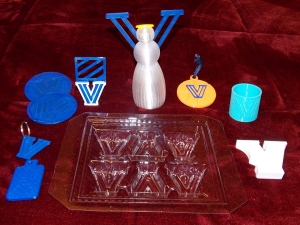3D Printing Competition Teaches Entrepreneurship and Raises Donations
by Daniel Fetsko ’19 CE

Working with the Administrative Assistant Terri Wosczyna, instructor and MDL Director George Simmons motivated the class and lead by example in conceiving the Villanova angel. Simmons designed and manufactured the angels and Wosczyna volunteered as director of sales.
As the fall semester came to a close, one engineering class in particular captured the Christmas spirit. In the Engineering Entrepreneurship minor class “Junior Entrepreneurship Practicum I,” nine teams participated in a 3-D printing competition that involved creating a product idea and an in-depth business plan, and then producing the product using the 3-D printers in the College’s Multidisciplinary Design Laboratory. Some of the items the students designed included a shot glass, keychains, coasters, an ice cube tray and a bottle opener. The profits, more than $2,700 in total, will be donated to Laurel House of Morristown, Pa., a battered women’s shelter.
This year’s class was comprised of 33 undergraduates from all different engineering disciplines. Instructor and MDL Director George Simmons says, “The assignment gave students experience in manufacturing products, developing a business and marketing plan and working in teams.” The project also presented an opportunity for competition as each team sought to produce the most profitable product. The winning team was determined by the highest score, which was calculated by dividing its profit by the number of members on the team. In addition to a free dinner paid for by Simmons, the winning team was given the option of choosing the charity to which all profits were contributed.
Enjoying their free meal and bragging rights were Olivia Cero ChE, David Lewis CpE, Andrew Pistana CPE, and Noah Schwanke CPE. Their team “Teen Titans” designed the popular Villanova shot glass and leveraged connections with sororities and other groups to market and sell their product. They also offered customized glasses for an additional fee.
Taking second place was team “Ninja Turtles” with their “V” keychain. Members Matthew Gross CPE, Tyler Moldovan ME and Michael Ubertaccio ME sold more than 150 keychains at $2 each.
Relaying the entire process, Simmons explains that there were several obstacles to overcome, beginning with motivating the students to get started. “Design, manufacturing and sales each take time, but the students did not realize that time is critical until halfway into the semester.” Because students waited until time was short, demand for the 3-D printers created a logjam. Simmons notes the length of the printing process: “A batch of 14 shot glasses takes 17 hours to print. Ten photo holders takes seven hours. A batch of 16 bottle openers takes 21.5 hours to print. The printers were running nearly 24/7.” In fact, just to keep production moving, Simmons took a printer home over Thanksgiving break and ran student batches 24/7 for five days in a row. Technical issues, printer demand from other groups and material shortages added to the complications. Plans for next year include adding at least two additional printers, stocking up on popular filament colors and requiring completion of critical milestones earlier in the semester.
As a whole, the engineering entrepreneurship program has continued to expand and grow in popularity. Aiming to help students grow into their creative, entrepreneurship potential, the program focuses not only on product design and innovation, but also effective business and management practices. In 2017, the program will launch E2SI, the Engineering Entrepreneurship Summer Institute in which students can complete the minor in only seven weeks. To learn more, visit the E2SI website.
